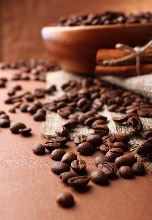The delicious coffee, the style of cappuccino.
It is the overall impression of aroma, acidity and mellowness, which can be used to describe the overall feeling of contrasting coffee.
Acidity [acidity]
It is the sour and strong quality of all the coffee grown on the plateau. Unlike bitterness or sour (sour), it has nothing to do with pH, but a refreshing and lively quality that promotes coffee to exert its functions of boosting the mind and clearing the taste.
Body [alcohol]
After drinking the coffee after conditioning, the taste of the coffee is left on the tongue. The change of mellowness can be as light as water to light, medium, high, fat, and even some Indonesian coffee is as thick as syrup.
Aroma [smell]
Aroma refers to the smell and aroma of coffee after conditioning. Bouquet is a less commonly used word that specifically refers to the taste of ground coffee powder. Aroma is usually specific and comprehensive. The words used to describe Aroma include: caramel, carbon roasted, chocolate, fruit, grass, malt, rich, rich, spicy and so on.
Bitter [bitter]
Bitterness is a basic sense of taste, and the sensory area is distributed at the base of the tongue. The bitterness of dark baking is deliberately created, but the most common cause of bitterness is too much coffee powder and too little water. Bitterness is not a consent word for sour.
Bland [light]
Coffee grown in the lowlands is usually quite light and tasteless. Coffee with insufficient powdered coffee and too much water will have the same light effect.
Briny [salty]
After brewing, if the coffee is overheated, it will produce a salty taste. The coffee in some coffee shops has this taste.
Earthy [aroma of soil]
Commonly used to describe Indonesian coffee with a spicy and earthy flavor. But the smell of mud does not refer to the smell of dirt on coffee beans. Some commercial coffees are mixed with cheap coffee, and the muddy smell may become dirty, apparently due to the dry, rough processing technology of laying coffee beans on the ground.
Exotic [uniqueness]
Describe coffee with its unique aroma and special flavor, such as flowers, fruits and spices. Coffee from East Africa and Indonesia usually has this property.
Mellow [aromatic alcohol]
It is an adjective for coffee with low to medium acidity and good balance.
Mild [mild]
It means that some kind of coffee has a harmonious and delicate flavor. Latin American premium coffee grown on the plateau is usually described as mild in texture. In addition, it is also a coffee term used to refer to all plateau coffee except those produced in Brazil.
Soft [soft]
Describe low-acidity coffee like Indonesian coffee; it can also be described as mellow or sweet.
Sour [acid]
A sense of taste in which the sensory area is mainly located at the back of the tongue and is characteristic of light-colored roasted coffee.
Spicy [Xiangxin]
Of a flavor or smell reminiscent of a particular spice. Some Indonesian plateau coffee (especially old coffee) contains the sweet smell of cardamom.
Strong [strong]
Technically, it describes the advantages and disadvantages of various tastes, or the relative ratio of coffee to water in a particular conditioned product. In terms of popular usage, strong describes the strong flavor of dark roasted coffee. In addition, it also misleads people into the illusion that it contains a lot of caffeine. In fact, canned light coffee is high in caffeine because it contains more decaf.
Sweet [sweet]
It is a widely used adjective, which is almost like fruit in nature and has something to do with the taste of wine. Coffee grown on the Costa Rican plateau usually has a pungent flavor.
Wild [wild]
Describe coffee as having extreme taste characteristics. If ordinary people cannot accept it, they will call it eccentric, but it may also be an attractive feature, depending on personal preference.
Winy [wine flavor]
Describe a charming flavor reminiscent of wine. Fruit-like acidity and smooth mellowness create a special contrast flavor. Kenyan coffee is the best example of wine flavor.

Important Notice :
前街咖啡 FrontStreet Coffee has moved to new addredd:
FrontStreet Coffee Address: 315,Donghua East Road,GuangZhou
Tel:020 38364473
- Prev

Extra-hard coffee beans filled with Guatemalan coffee beans American coffee network
Boutique coffee is fresh coffee. Whether it's food or drink, of course, the fresh the better, and so is boutique coffee. High-quality coffee should keep the coffee beans fresh before making, including the preservation of baked beans, and grind the coffee beans into powder before making, which is also to retain its original and best flavor. And the way of making hand-made coffee is such a way to make high-quality coffee.
- Next

Of all the coffee exports from Honduras, most of them are exported to the United States and Germany where to buy coffee beans.
Boutique coffee is fresh coffee. Whether it's food or drink, of course, the fresh the better, and so is boutique coffee. High-quality coffee should keep the coffee beans fresh before making, including the preservation of baked beans, and grind the coffee beans into powder before making, which is also to retain its original and best flavor. And the way of making hand-made coffee is such a way to make high-quality coffee.
Related
- Does Rose Summer choose Blue, Green or Red? Detailed explanation of Rose Summer Coffee plots and Classification in Panamanian Jade Manor
- What is the difference between the origin, producing area, processing plant, cooperative and manor of coffee beans?
- How fine does the espresso powder fit? how to grind the espresso?
- Sca coffee roasting degree color card coffee roasting degree 8 roasting color values what do you mean?
- The practice of lattes: how to make lattes at home
- Introduction to Indonesian Fine Coffee beans-- Java Coffee producing area of Indonesian Arabica Coffee
- How much will the flavor of light and medium roasted rose summer be expressed? What baking level is rose summer suitable for?
- Introduction to the characteristics of washing, sun-drying or wet-planing coffee commonly used in Mantenin, Indonesia
- Price characteristics of Arabica Coffee Bean Starbucks introduction to Manning Coffee Bean Taste producing area Variety Manor
- What is the authentic Yega flavor? What are the flavor characteristics of the really excellent Yejasuffi coffee beans?

